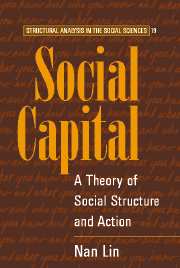Book contents
- Frontmatter
- Contents
- Preface
- Part I Theory and Research
- Part II Conceptual Extensions
- 8 Social Capital and the Emergence of Social Structure
- 9 Reputation and Social Capital
- 10 Social Capital in Hierarchical Structures
- 11 Institutions, Networks, and Capital Building
- 12 Cybernetworks and the Global Village
- Part III Epilogue
- References
- Index
12 - Cybernetworks and the Global Village
The Rise of Social Capital
Published online by Cambridge University Press: 05 June 2012
- Frontmatter
- Contents
- Preface
- Part I Theory and Research
- Part II Conceptual Extensions
- 8 Social Capital and the Emergence of Social Structure
- 9 Reputation and Social Capital
- 10 Social Capital in Hierarchical Structures
- 11 Institutions, Networks, and Capital Building
- 12 Cybernetworks and the Global Village
- Part III Epilogue
- References
- Index
Summary
One recent controversy in the study of social capital has been an issue raised by Putnam (1993, 1995a, 1995b): whether social capital has been on the decline in the United States for the past three or four decades. Putnam argues that there should be a positive association between social capital and political participation, and he measures social capital in terms of participation rates in social associations or secondary/tertiary associations such as PTAs, Red Cross associations, unions, church-affiliated groups, sports groups, and bowling leagues. Political participation is indicated by voting, writing to Congress, participating in rallies and political meetings, and so on. Putnam has observed that both participation rates have declined in the United States over the past thirty years or so. This has led him to conclude that social capital or civic engagement has been on the decline, and this decline might be responsible for a decline in democratic and political participation. Further, he suggests that the culprit may be the rise of television viewing. As television has gained popularity, the younger generations of Americans are no longer interested in participating in civil associations. Indeed, he suggests, even when they go bowling, they may bowl as individuals rather than as groups or leagues.
Putnam's thesis and research have been challenged from a variety of theoretical and methodological perspectives. These challenges fault Putnam's work primarily on two grounds. First, he committed errors in measuring social capital.
- Type
- Chapter
- Information
- Social CapitalA Theory of Social Structure and Action, pp. 210 - 240Publisher: Cambridge University PressPrint publication year: 2001



